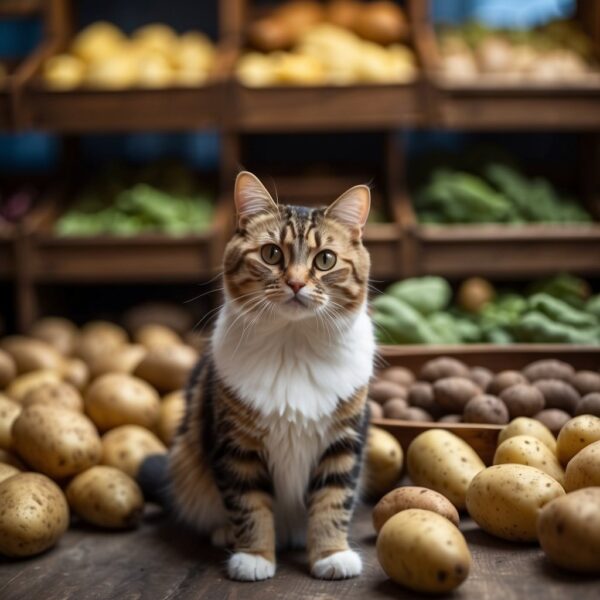
Cats And Potatoes? Safety and Nutrition
Can cats eat potatoes? Cat parents often wonder if human foods, such as potatoes, are safe for their pets. Cats are obligate carnivores, meaning their nutritional needs are primarily met by consuming animal proteins. However, in the context of a varied diet, guardians might consider supplementing their cat’s meals with other foods. Potatoes, which are non-toxic to cats, can be seen as a potential option, but it’s important to recognize that they should only be offered in moderation.
While potatoes are not necessarily harmful to cats, they are not a natural part of their diet. Cooked potatoes, free from spices, salts, and fats, can be fed occasionally and in small quantities. Despite being safe, they do not provide any essential nutritional value that cats cannot obtain from their standard meat-based diet. Furthermore, different forms of potatoes, such as raw, fried, or seasoned, can be problematic and should be avoided to prevent any adverse effects on a cat’s health.
Key Takeaways
- Potatoes are non-toxic and may be fed to cats in moderate, occasional amounts.
- Cats derive their nutritional needs from animal proteins, and potatoes are not essential to their diet.
- It is crucial to ensure that potatoes are cooked and unseasoned if they are to be fed to cats, to prevent health issues
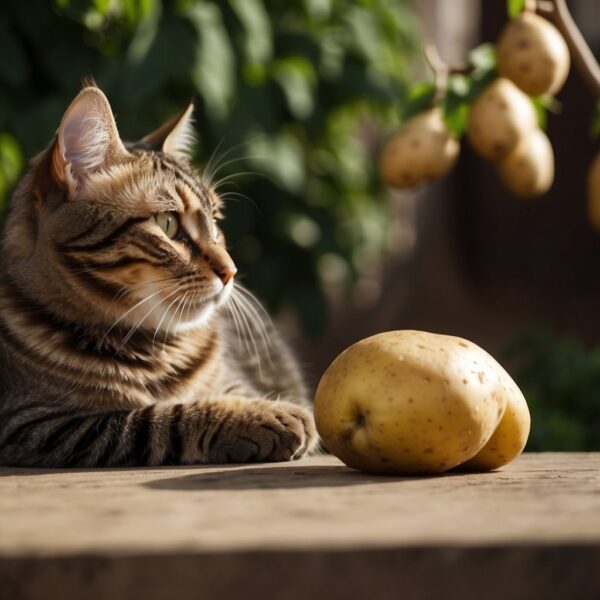
Cats and Potatoes: Can Cat Eat Potatoes?
Cats exhibit a curiosity for human foods, one of which might be potatoes. This section delves into whether potatoes are suitable for feline consumption, the potential toxicity of potatoes, preferred cooking methods for safety, and the health implications associated with cats eating potatoes.
Are Potatoes Safe for Cats?
Potatoes, when cooked properly, can be non-toxic and safe for cats in small quantities. However, they should only be given as an occasional treat rather than a regular part of a cat’s diet.
Toxicity of Raw Potatoes
Raw potatoes contain solanine, a substance that is toxic to cats. Solanine can remain in potatoes even after cooking if the temperature is not high enough. Symptoms of solanine poisoning include:
- Vomiting
- Diarrhea
- Lethargy
Potato Cooking Methods and Cat Safety
Cooking is crucial to eliminate solanine toxicity. Acceptable methods include:
- Boiled
- Baked (without harmful toppings)
Unsafe cooking methods that can harm a cat:
- Fried potato (contains excessive oil and fats)
- Roast (often seasoned with onion, garlic, or other spices which are harmful)
Health Benefits and Risks
While potatoes can provide a source of fiber and other nutrients in small amounts, they carry risks if not prepared safely and can lead to health issues such as obesity due to their carbohydrate content. There is no nutritional requirement for cats to consume potatoes, as they are obligate carnivores.
Effects of Different Potato Types
When considering potatoes as a potential treat for cats, it’s important to differentiate between the types and preparations of potatoes. The way potatoes are served can greatly impact their safety and nutritional value for felines.
White vs Sweet Potatoes for Cats
White potatoes and sweet potatoes differ significantly in their composition and impact on a cat’s health. White potatoes should only ever be served to cats if they are cooked and peeled, as the raw peel contains solanine, which can cause solanine intoxication. Symptoms of solanine poisoning include vomiting, diarrhea, and lethargy. In contrast, sweet potatoes, while generally safer, should also be served cooked and without the skin to ensure digestibility and to diminish the risk of solanine toxicity.
- White Potatoes: Must be cooked and peeled; raw is toxic.
- Sweet Potatoes: Safer than white but still should be cooked and peeled.
Effect of Potato Skins and Seasoning
The skins of both white and sweet potatoes carry risks due to the presence of solanine, especially in green or sprouting spots, which are indicators of higher solanine levels. Cats eating potato skins may experience solanine intoxication. Seasoning is another consideration; cats’ systems are not equipped to handle seasonings, which can lead to stomach upset or more severe health issues. Therefore, any potato given to a cat should be free of seasoning, including salt.
- Potato Skin: Contains solanine, which is toxic to cats.
- Seasoning: Can cause stomach upset; potatoes served to cats must be plain.
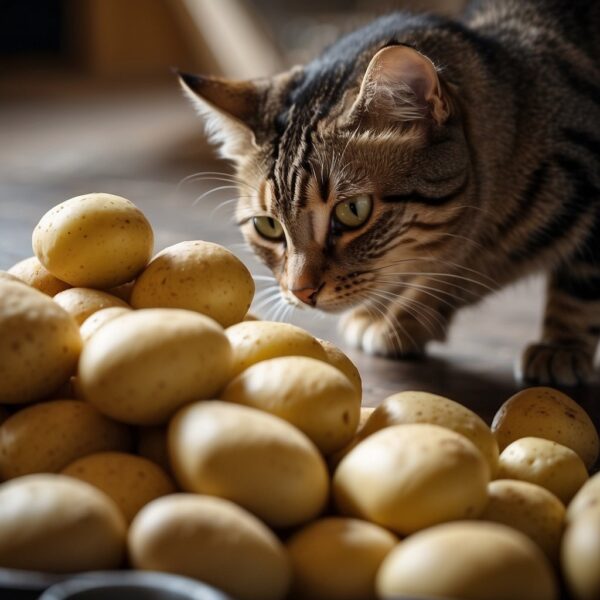
Understanding Feline Nutrition
When considering feline nutrition, it is crucial to understand that cats have specific dietary needs due to their status as obligate carnivores. Their diet must be rich in proteins and certain other nutrients to maintain their health, while carbohydrates play a different role compared to a human’s diet.
Obligate Carnivore Diet
Cats are obligate carnivores, which means their diet must be predominantly composed of meat. This biological necessity arises from their evolutionary adaptation to a diet that is high in protein, with fats as a secondary energy source. Commercial cat food often attempts to replicate this balance, providing the necessary animal-based proteins that are crucial for a cat’s health.
Protein and Carbohydrate Balance
The balance between proteins and carbohydrates in a cat’s diet is significant. While proteins are the cornerstone of their nutritional needs, cats can metabolize carbohydrates for energy. However, the inclusion of carbs in cat food should be managed to emulate the natural macronutrient mix cats would get from their prey. It’s important to note that cats lack certain enzymes to process carbohydrates as efficiently as humans do.
Nutritional Requirements
Cats require various essential nutrients that they would normally obtain from their natural prey. This includes a high level of protein, essential fatty acids, vitamins such as Vitamin B6, and minerals. Fiber, while not a primary need, is often incorporated into commercial cat food to aid in digestion. The diet must also be low in carbohydrates to prevent weight gain and related health issues. It’s essential for cat food manufacturers to include all these components to ensure proper feline health.
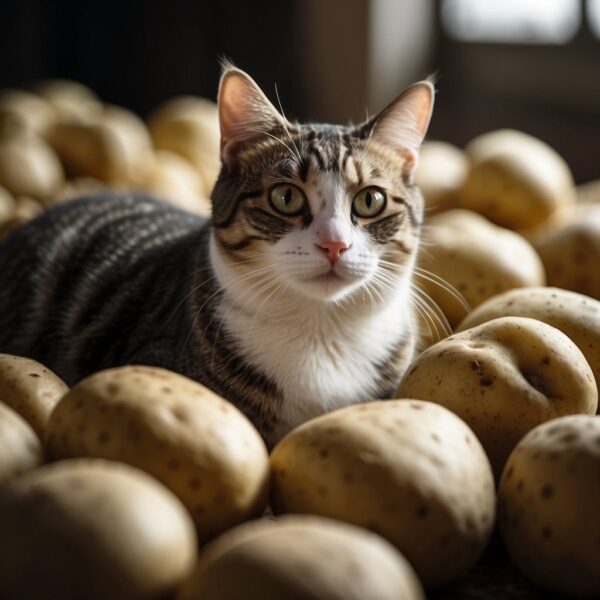
Potential Health Issues
When it comes to cats consuming potatoes, there are significant health concerns to be aware of. Potatoes can lead to digestive health issues and, if consumed frequently or in large quantities, might result in long-term health complications for cats.
Digestive Health Concerns
The feline digestive system is not designed to process large amounts of carbohydrates and plant-based foods. Potatoes can cause acute digestive problems such as:
- Upset stomach: May manifest as discomfort or pain.
- Vomiting: The body’s response to eject indigestible or irritating substances.
- Diarrhea: Rapid movement of food through the digestive system prevents proper absorption.
Feeding cats raw potatoes is a definitive no, as they contain solanine, a toxin that is harmful to cats and humans alike.
Long-Term Health Complications
Moreover, beyond immediate digestive issues, potatoes can contribute to more serious health concerns over time:
- Weight gain: Excessive carbohydrates can lead to obesity.
- Diabetes: A high-carb diet is a risk factor for feline diabetes.
- Pancreatitis: Inflammation of the pancreas, often associated with a high-fat diet but can also be influenced by overall diet quality.
Cats should derive the majority of their nutrition from high-protein, meat-based diets, and potatoes offer minimal nutritional benefits for them.
Feeding Your Cat Potatoes
When considering potatoes as a treat for your cat, it is crucial to prepare them safely and understand their place in a cat’s diet. Potatoes should be thoroughly cooked, unseasoned, and offered in moderation as an occasional treat, not as a regular part of their diet.
How to Safely Include Potatoes in a Cat’s Diet
- Cook Thoroughly: A cat can consume cooked potatoes without spices, fat, or salt. Ensure they’re fully cooked to avoid any digestive issues.
- Avoid Potato Peels: Never feed your cat potato peels due to potentially harmful substances.
- Moderation is Key: Offer potatoes in small quantities. Regular cat food provides complete nutrition, and potatoes are only supplemental.
- No Raw Potatoes: Raw potatoes contain solanine, which is toxic to cats, so they should always be avoided.
Alternatives to Potatoes
For cat parents looking for healthier treat options, consider vegetables that are safer and can offer nutritional benefits:
- Sweet Potatoes: A better option than white potatoes, but still only in small, cooked amounts.
- Peas and Carrots: These can be a good source of vitamins but serve them cooked and in moderation.
- Zucchini: This vegetable is safe for cats and can be a low-calorie treat.
Incorporating small amounts of these human foods into a cat’s diet can provide a variety in their treats without compromising their overall nutritional needs.
cats and potatoes: Emergency Situations
In cases where a cat has ingested potatoes, certain situations require immediate attention. Knowing the signs of potato poisoning and when veterinary care is necessary can be crucial for a cat’s health.
Signs of Potato Poisoning
Cats may exhibit various symptoms if they ingest toxic parts of a potato, which contains solanine, a chemical compound that can be harmful. Specific signs of solanine poisoning include:
- Vomiting
- Diarrhea
- Lethargy
- Abdominal pain
- Confusion
- Respiratory problems
When to Contact Your Vet
Immediate contact with a veterinarian is necessary if a cat shows any symptoms of poisoning after eating potatoes. Here are specific circumstances when veterinary help is important:
- If a cat consumes raw potato or potato plants, including leaves and stems.
- Upon the slightest signs of lethargy or abnormal behavior post ingestion.
- If common poisoning symptoms like vomiting or diarrhea occur.
Prompt consultation with a vet ensures the well-being of your cat and appropriate management of any potential solanine intoxication.
Nutritional Myths and Facts
In considering the place of potatoes in a cat’s diet, it’s essential to differentiate between misconceptions and the actual nutritional value potatoes can offer to felines.
Debunking Common Misconceptions
One pervasive myth is that potatoes can serve as a staple in a cat’s diet, providing all the necessary nutrition. This is incorrect; cats are obligate carnivores, and their primary source of nutrition should be animal protein. Potatoes lack the essential amino acids and taurine that cats require for optimal health. Furthermore, some believe that raw potatoes are safe for cats. However, they contain compounds that are toxic to cats and can lead to gastrointestinal distress or worse.
Understanding the Nutritional Value of Potatoes
Potatoes provide certain nutrients such as vitamin C and potassium. They also contain some fiber and sugars. But when discussing cats, the nutritional benefits of these components must be put into context. These nutrients do not align with a cat’s dietary needs; the carbohydrate-heavy and low-protein makeup of potatoes does little to support a cat’s health. While they are non-toxic when cooked and free from seasonings, potatoes should be viewed only as an occasional treat and not a nutritional supplement.
- Vitamin C: Cats synthesize their own and do not require dietary sources.
- Potassium: While vital, it’s already sufficiently supplied in well-formulated cat food.
- Fiber: Can aid in digestion, but cats need it in smaller amounts than humans or herbivorous animals.
- Sugars: Generally, should be minimized in a cat’s diet to prevent obesity and related health issues.
Conclusion
This section consolidates the detailed examination on the suitability of potatoes in a cat’s diet.
Key Takeaways
- Health: Potatoes can provide certain nutritional benefits to cats, including essential vitamins, minerals, and dietary fiber.
- Safety: Cooked potatoes, both white and sweet varieties, are safe for feline consumption in moderation, devoid of green parts that contain solanine.
- Cats Can Eat Potatoes: They should be offered in small amounts and should never replace a significant portion of their carnivorous diet.
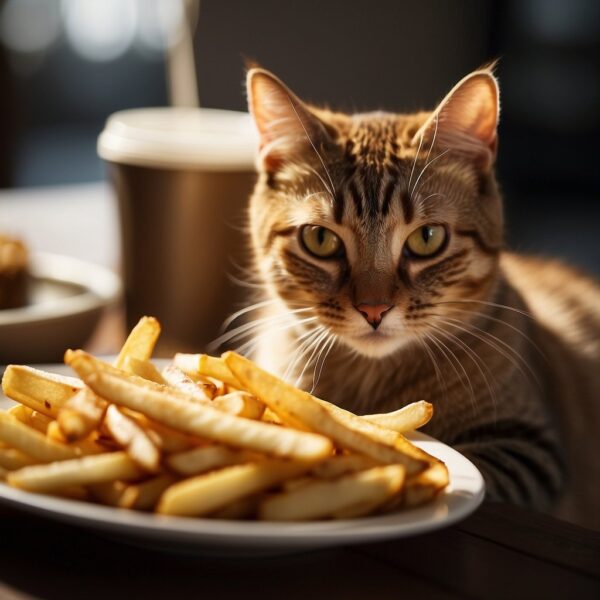
Frequently Asked Questions
Cats and potatoes can be a complex mix, with certain forms safe in moderation and others a potential health risk. Understanding the nuances of how potatoes impact a cat’s diet is important for responsible pet ownership.
Is it safe for cats to eat cooked potatoes?
It is generally safe for cats to eat cooked potatoes in small, occasional amounts as they are not toxic once cooked. However, they should not constitute a significant part of a cat’s diet.
Are potato skins toxic to cats?
Potato skins can be toxic to cats because they potentially contain solanine, especially if they are green or sprouting. Always remove potato skins before offering any cooked potato to a cat.
Can I give my cat sweet potatoes as a treat?
Sweet potatoes are not toxic to cats, but like regular potatoes, should only be given in small amounts as a treat and not a regular part of their diet.
Should I avoid feeding my cat potato chips?
Cats should not eat potato chips due to the high salt content and additives, which are not suitable for a cat’s dietary needs and can be harmful.
What are the risks of feeding cats raw potatoes?
Raw potatoes contain solanine, which is toxic to cats, and may cause gastrointestinal distress or more serious health issues. They should never be fed to cats.
Can mashed potatoes be a part of my cat’s diet?
Mashed potatoes can be fed to cats in small quantities, provided they do not contain additives like butter, salt, or milk, which can be detrimental to a cat’s health. It is essential to ensure the potatoes are cooked and plain.